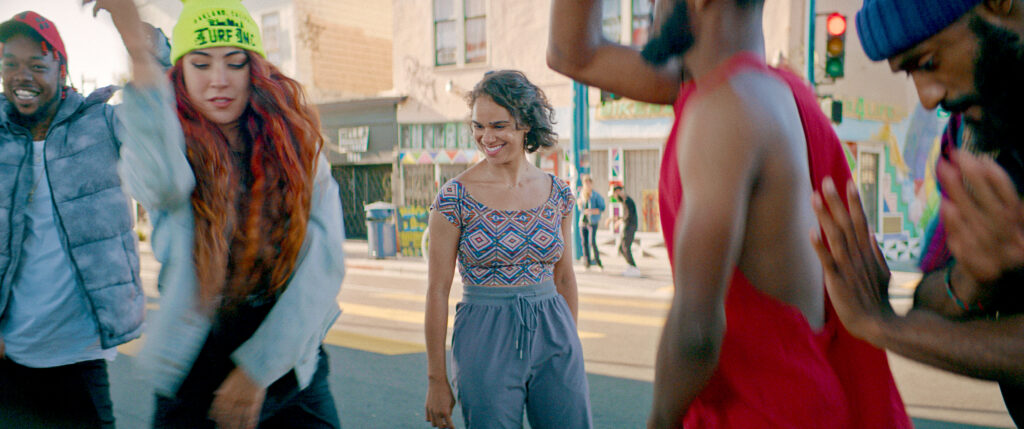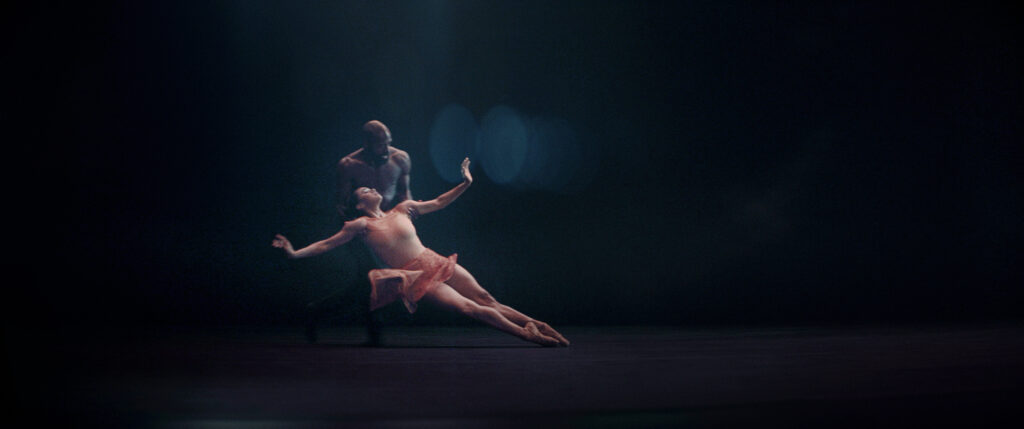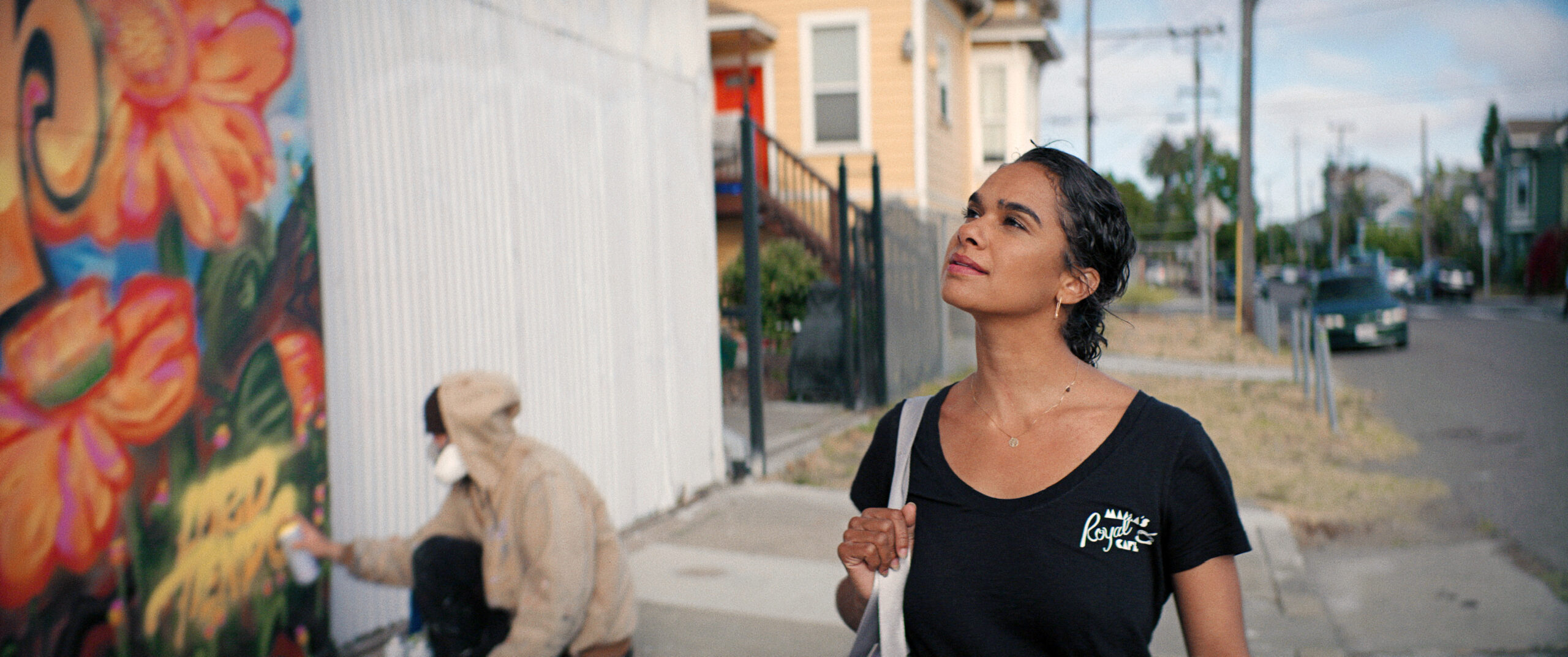Misty Copeland’s New Film, Flower, Explores Inequity and Celebrates Community
After a three-year hiatus from performing, Misty Copeland is back in the limelight with her new 28-minute film, Flower, which centers on themes of housing insecurity, gentrification, and the communal power of art. The film is the debut project of Copeland and longtime friend Leyla Fayyaz’s production company, Life in Motion Productions. Directed by Lauren Finerman, whose previous work includes the documentary Ballet 422, Flower premiered at this year’s Tribeca Film Festival and was presented as part of Lincoln Center’s Summer for the City programming on July 1.
Copeland plays Rose, a dance teacher and waitress supporting her mother, Gloria (former Dance Theatre of Harlem and Complexions Contemporary Ballet member Christina Johnson), who lives with dementia. The two struggle to keep their home in a rapidly gentrifying Oakland, California. Rose befriends Sterling (Alonzo King LINES Ballet’s Babatunji Johnson), a local man who renews her hope for the future of her community and its culture. Throughout the film, Rose and Sterling largely interact through contemporary dance, with Sterling also communicating through turf dance, a street style that originated in Oakland.
Flower is mostly nonverbal, creating an inclusive story ballet in film form. It took root years ago, when executive producer Nelson George—who directed the documentary about Copeland, A Ballerina’s Tale—encouraged Copeland to further explore acting after seeing her perform La Bayadère in California. Copeland and Fayyaz, Flower’s producer, continued to develop the idea. “We took the ball and ran with creating a new form of storytelling for film,” Copeland tells Pointe. “That has been like our baby that we’ve birthed during the pandemic, but with a lot of intention.” The only dialogue comes from unhoused individuals, meant to give voice to the voiceless.
“I feel that the work I’m doing off the stage is equally as important as being a presence on the stage,” says Copeland. “This is the direction that dance and ballet should be moving in—telling these types of stories that will invite different communities and make them feel seen and heard.”
Most of Flower’s creative team have ties to Oakland. Copeland was inspired by the city, her husband’s hometown, for its history of activism and the way its youth culture uses art as a tool for social justice. “It was important for the creatives to have a real say in cooperation with the project,” she says.

The film features choreography by Alonzo King and creative pair Rich + Tone Talauega, and music composed by Raphael Saadiq. Copeland began working with King on the movement approximately a month and a half before filming started. “We just went into the studio and started creating,” she says. “He would ask me, ‘What do you think your character would be saying in this moment?’ Then, we would create based off of that, and we gave Rich + Tone the space and freedom to do what they do, like with conversations about who Babatunji Johnson’s character was.” Copeland wanted the choreography to feel fully relatable and human. “I have such a sensitivity to different genres of dance coming together,” she says. “It can work so beautifully and organically, and feel like a conversation of two different languages.”
At times, Rose escapes into a dreamlike state. In one scene, inspired by the 1983 hit Flashdance, she warms up and freestyles before teaching a ballet class. She then appears to be transported to the stage of Segerstrom Center for the Arts, highlighting the comfort and freedom she finds in movement. The addition of Segerstrom was originally unplanned. “It was just supposed to be in the studio, in my element, and then I loved the idea of this transformation,” Copeland says.
The walls of Rose’s studio are decorated with illustrations of trailblazing dancers by Salena Barnes from Copeland’s book, Black Ballerinas: My Journey to Our Legacy. “We wanted it to feel authentic to this character and her connection to the Black community and Black dance community,” says Copeland.

Copeland reflects on Flower as her first performance since the pandemic and motherhood. “Even with the surgeries and injuries I’ve had, I’ve never taken that much time off from dance, so my body was in a very different state,” she says. During the biggest dance scene—a pas de deux between Rose and Sterling—she was pregnant. “To have that experience within this new experience of being a producer and in this type of film, it felt good. Now, stepping back and watching it, I feel like there are so many layers to my intentions, but also what I was feeling in those moments.”
During a talkback with CNN’s Sara Sidner following the Lincoln Center screening, Copeland and Fayyaz revealed plans to make Flower a series of shorts, with each focusing on an issue specific to a different city. “We were able to provide jobs to people in the area, especially during a time when people weren’t getting as much work and productions were closed down,” Fayyaz said of the Oakland installment. “We want to continue doing that in other communities across the country.”




